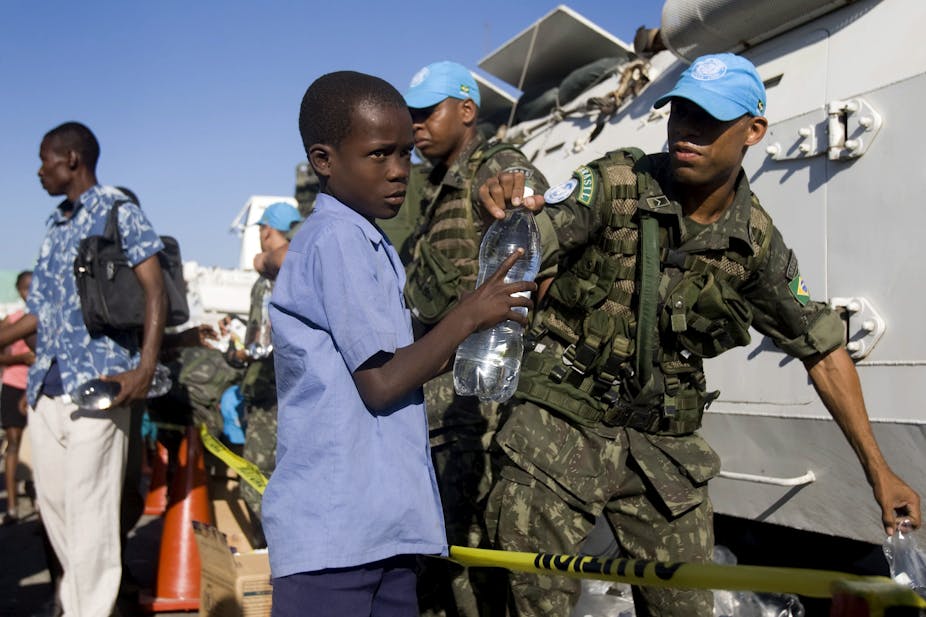In October 2010, a cholera outbreak began in Haiti for the first time in more than 100 years. The strain that was brought into Haiti has been traced to a region in Nepal from which a UN peacekeeping contingent arrived days before the outbreak and it has been established that the United Nations failed adequately to screen its peacekeepers for the disease prior to them entering into Haiti.
Poor waste management at the UN peacekeepers’ camp resulted in infected human faeces being deposited in a tributary that feeds into Haiti’s main river. Within the first 30 days, Haitian authorities recorded almost 2,000 deaths from cholera. At its July 2011 peak, the epidemic was infecting one person every minute – and four years on, the country is still struggling to rid itself of the disease.
But on September 30, a New York judge gave cholera victims pursuing justice a new ray of hope, ordering oral submissions on whether the United Nations can be brought before the court. The hearing date is now set for October 23.
The issue is one of great sensitivity, politically and legally – and this is a seminal moment, not only for the claimants in this case but also for the UN itself. Until now, the UN has hidden behind a cloak of immunity that protects it from being brought before national courts. But the oral arguments judge will hear will question whether or not that immunity should in fact exist – potentially putting the UN in a highly awkward situation.
Rights and responsibilities
The UN does not dispute that its peacekeepers brought cholera into Haiti; nor is it seeking to absolve itself of blame for the conditions inside the peacekeepers’ camp. Instead, it has simply refused to compensate victims of the cholera outbreak.
It has also failed to set up local claims boards, despite having a clear legal duty to do so under the Convention on Privileges and Immunities of the United Nations. With that failure, it has denied individuals their fundamental human right to access a court and to seek a remedy – a right enshrined in legal systems around the world.
The UN supposedly has absolute immunity from being brought before national courts. That makes sense; the UN must be able to operate without fear of frivolous or politicised litigation. However, that immunity must not be used as an excuse for human rights violations.
Human rights, after all, is one of the UN’s three pillars; like its member states, the organisation is bound by international law to uphold them. And the counterbalance to the UN’s absolute immunity is that it must provide alternative dispute resolution mechanisms. That obligation is enshrined in Section 29 of the Convention on Privileges and Immunities, as well as in the Model Status of Forces Agreement.
In the past, the UN has used lump-sum settlements, claims commissions, mediation and arbitration to ensure that individuals are able to realise their rights to access a court and a remedy. But the cholera victims in Haiti have not been offered any of those mechanisms, or any alternatives.
Instead, the UN has all but ignored their claims. The secretary-general, Ban Ki-Moon, has pointed to the UN’s absolute immunity from jurisdiction as a bar to individuals bringing claims against it and has made clear that compensation for individuals will not be part of the organisation’s clean-up package in Haiti.
All change
The cholera litigation has been brought by the Institute for Justice and Democracy in Haiti (IJDH), acting on behalf of thousands of claimants. The IJDH is mounting a significant challenge to UN immunity, and has submitted numerous amici briefs from international law scholars and practitioners in the US and in Europe.
Case law from various courts and jurisdictions shows that the UN’s absolute immunity has been challenged, albeit unsuccessfully, on the facts of a great many cases. The basis for those challenges has been that the UN’s legal immunity violates claimants’ rights to access a court and to a judicial remedy – and in all of the cases so far, the UN has argued that individuals’ ability to access alternative mechanisms for dispute resolution means their rights have been realised.
But the Haitian victims have no alternative mechanism through which to resolve their dispute. The scene is therefore set for the first successful challenge to the UN.
If the UN continues to ignore the rights of cholera victims, it may well find its absolute legal immunity blown out of the water. That will be a win for the cholera victims, but it also set a precedent for which the UN is not ready. We could soon start to see cases being brought against the UN in other jurisdictions.
It seems clear that the better alternative for everyone would be for the UN to accept responsibility for the cholera outbreak and to offer an alternative method of dispute resolution while that opportunity remains on the table. Otherwise, the UN’s peacekeeping operations around the world could soon find themselves under a level of scrutiny they have never before experienced.

